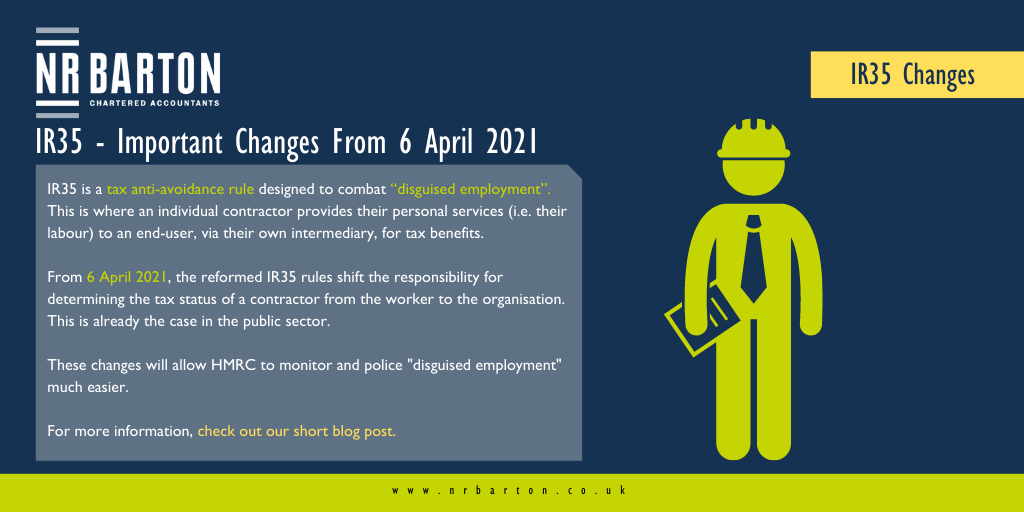What is IR35?
IR35 is a tax anti-avoidance rule designed to combat “disguised employment” in situations where an individual contractor is providing their personal services (i.e. their labour) to an end-user via their own intermediary, such as a personal services company or partnership (PSC) for tax benefits.
Under current (i.e. pre-April 2021) IR35 rules, the contractor is responsible for assessing whether IR35 applies and, if so, operating PAYE and NICs on the fees the PSC receives (excluding VAT) less certain statutory deductions.
What is changing?
Off-payroll working rules change on 6 April 2021 and are applied differently. From this date, all public authorities and medium and large sized businesses in the private sector will be responsible for deciding the employment status of workers (sometimes known as contractors).
The plans for reforming IR35 in the private sector arise from concerns of HM Revenue & Customs (HMRC) about non-compliance with it. Under the reforms, responsibility for assessing whether IR35 applies will move from the contractor/PSC to the end-user. If the end-user determines that IR35 applies, the responsibility for operating PAYE and NICs will move from the PSC to the “fee payer”. The reforms will apply to any payments made on or after 6 April 2021, unless all the contractor’s labour was provided before that date.
HMRC’s expectation is that IR35 compliance will become easier to monitor and police. It is also predicted that end-users will take a more compliant approach to IR35 assessments and will be more likely to conclude that contractors are in scope, resulting in increased tax and NICs.
Overview of the new process:
The end-user is required to assess whether the contractor is employed or self-employed for tax purposes. It must take reasonable care in making that assessment and confirm its assessment together with reasons in a Status Determination Statement (SDS).
The end-user must provide the SDS to the contractor before making the first payment to them. If there is an agency in the chain, the SDS must also be provided to the agency. In practice, we expect that contractors accepting a new assignment are likely to want to know in advance whether they will be assessed as within the scope of IR35.
The end-user is required to have a dispute resolution procedure to enable the contractor to challenge the assessment. A contractor is unlikely to challenge an SDS which assesses them as falling outside the scope of IR35. However, HMRC may review the assessment so it is important that the SDS sets out in sufficient detail the basis on which the decision is made, showing that reasonable care has been taken.
If the assessment concludes that the contractor is out of scope of IR35, the PSC can continue to be paid gross. If, however, the contractor is assessed as within IR35, the fee payer is responsible for operating PAYE and deducting employee NICs on the fees it pays to the PSC (excluding VAT). The fee payer must also pay employer NICs and, where applicable, the apprenticeship levy.
Examples of cases where HMRC may class a contractor as an employee:
- If the contractor does not have complete control over how they complete their work i.e. if the fee payer is responsible for setting out the contractor’s work patterns.
- If the fee payer provides the contractor with equipment to complete the work
- If the same contractor is used for a long period of time, as this will be viewed as an employee-employer relationship.
Exemption for small companies
The new changes from 6 April only apply to medium and large sized firms. For firms which fall under the “small business” category, the responsibility for assessing the arrangements, and applying IR35, will remain with the contractor.
A small business as defined by the Companies Act 2006, is a business that has two or more of the following features:
- a turnover of £10.2m or less;
- a balance sheet total of £5.1m or less; and/or
- 50 employees or less.
If you have any questions about the information in this article, please contact your usual Partner or Manager, or call us on 01942 242 245 and we will be happy to help.


